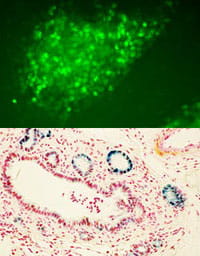Stem Cell Biology
 Research in this area focuses on identifying and manipulating stem cells to replace tissues damaged by disease and injury. It is estimated that many diseases could ultimately be treated with stem cell-based therapies.
Research in this area focuses on identifying and manipulating stem cells to replace tissues damaged by disease and injury. It is estimated that many diseases could ultimately be treated with stem cell-based therapies.
Scientists here investigate new ways to use adult and embryonic stem cells to promote regeneration and to generate tissues for transplantation to cure childhood disease. The Cincinnati Children's Research Foundation has initiated a seven-year expansion project that includes a new state-of-the-art research building and a commitment to hire new faculty members that study stem cell biology.
Faculty
 |
Theresa Alenghat, PhD, Assistant Professor Molecular mechanisms that mediate intestinal homeostasis and the host-microbiota relationship. [Visit the Alenghat Lab] |
 |
Jose A. Cancelas Perez, MD, PhD, Associate Professor Cellular and molecular mechanisms of norm and cancer hematopoietic stem cells. [Visit the Cancelas Lab] |
 |
Cristina Cebrian Ligero, PhD, Assistant Professor The Cebrian lab studies the molecular and cellular mechanisms that drive kidney organogenesis and renal disease. |
 |
Steve Danzer, PhD, Associate Professor My laboratory focuses on elucidating the mechanisms by which epilepsy develops, with the ultimate goal of developing novel therapies to prevent or treat the disease. We are currently conducting studies on the roles of the mTOR signaling pathway and adult generated neurons in epilepsy. [Visit the Danzer Lab] |
 |
Tony De Falco, PhD, Assistant Professor The De Falco lab is interested in uncovering the mechanisms underlying the differentiation of the fetal gonad, focusing on how myeloid cells (such as macrophages) and vasculature promote tissue remodeling during organogenesis. Additionally, we are investigating the roles of myeloid cells in regulating spermatogonial stem cell differentiation in the adult testis. [Visit the De Falco Lab] |
 |
Lee Grimes, PhD, Professor Hematopoiesis, molecular biology, and molecular oncology including mouse modeling of hematopoiesis, myelopoiesis and leukemia. [Visit the Grimes Lab] |
 |
Stacey S. Huppert, PhD, Associate Professor Intercellular signaling pathways that regulate the patterning of liver architecture during development and regeneration. [Visit the Huppert Lab] |
 |
Qing Richard Lu, PhD, Professor Transcriptional and epigenetic control of glial development and brain tumor initiation. [Visit the Lu Lab] |
 |
Doug Millay, PhD, Assistant Professor We are interested in the mechanisms of cell-cell fusion, using skeletal muscle development and regeneration as a model system. [Visit the Millay Lab] |
 |
James C. Mulloy, PhD, Professor Molecular mechanisms involved in leukemia induction and maintenance; mouse modeling of leukemia using primary human blood stem cells. [Visit the Mulloy Lab] |
 |
Joo-Seop Park, PhD, Assistant Professor Gene regulatory networks regulating stem/progenitor cells in development and disease. [Visit Urology] |
| Soona Shin, PhD, Assistant Professor Molecular mechanisms of childhood liver cancer with a focus on hepatic stem/progenitor cells. [Visit the Shin Lab] |
|
 |
Takanori Takebe, MD, Assistant Professor Developing a complex organoid (or organ bud) model using human pluripotent stem cells by studying endoderm organogenesis and promoting applications towards modern human development, disease model and therapeutic transplantation. [Visit Gastroenterology, Hepatology & Nutrition] |
 |
Jim Wells, PhD, Professor Endoderm organogenesis and promoting the differentiation of embryonic stem cells into therapeutic endoderm derivatives. [Visit the Wells Lab] |
 |
Susanne Wells, PhD, Professor Papilloma virus and cervical cancer. [Visit the Susanne Wells Lab] |
 |
Jeffrey A. Whitsett, MD, Professor Organ morphogenesis, gene regulation, cell differentiation, respiratory disease. [Visit the Whitsett Lab] |
 |
Chunyue Yin, PhD, Assistant Professor The molecular and cellular mechanisms underlying liver development and disease pathogenesis using the zebrafish model organism. [Visit the Yin Lab] |
 |
Amanda Zacharias, PhD, Assistant Professor Our lab studies how gene expression is regulated by signaling pathways during embryonic development. We use Wnt signaling in the nematode worm, C. elegans, as a model system and utilize a novel time-lapse imaging approach. [Visit Zacharias Lab] |
 |
Yi Zheng, PhD, Professor Molecular mechanisms of Rho GTPase signal transduction. Development of novel therapeutic reagents to inhibit Rho pathways related to human pathological conditions. [Visit Zheng Lab] |
 |
Aaron Zorn, PhD, Professor Molecular mechanisms of endoderm organ development. [Visit the Zorn Lab] |



